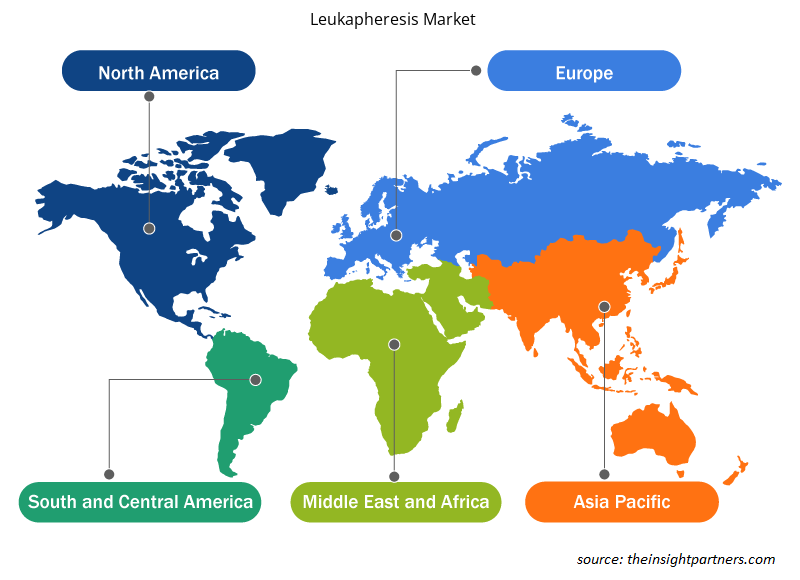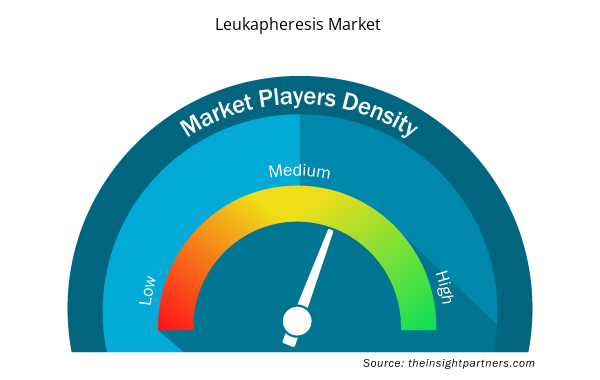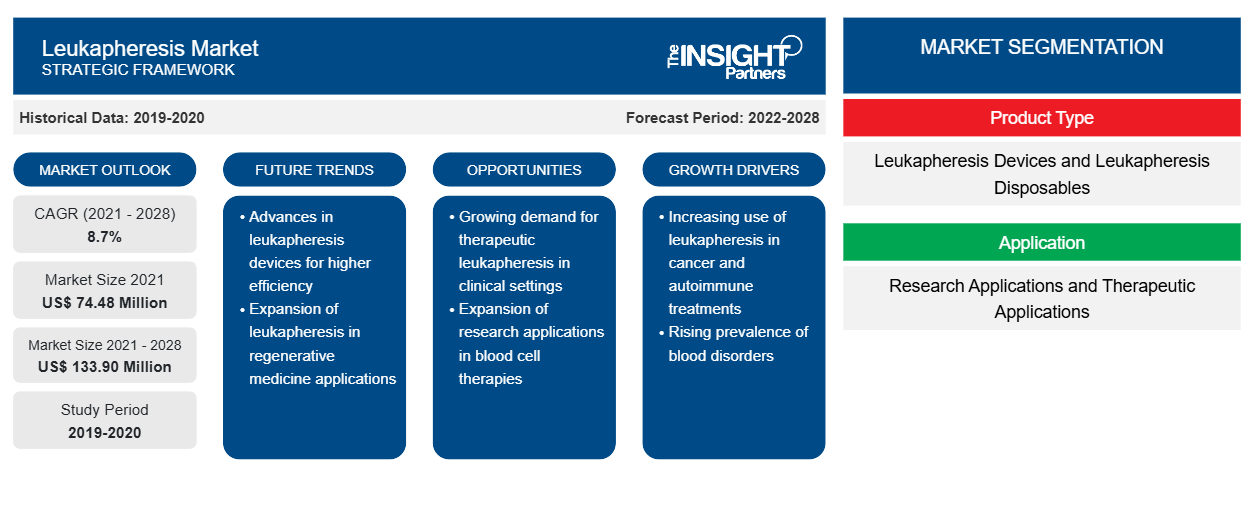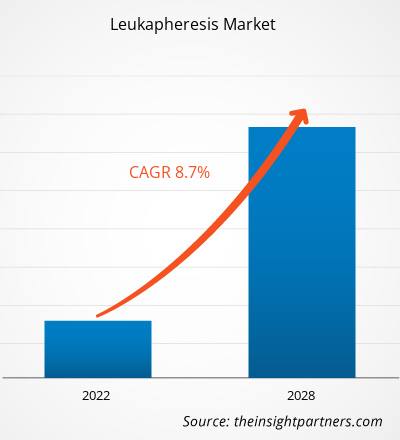[Forschungsbericht] Der Leukapherese-Markt soll von 74,48 Millionen US-Dollar im Jahr 2021 auf 133,90 Millionen US-Dollar im Jahr 2028 anwachsen; von 2021 bis 2028 wird ein durchschnittliches jährliches Wachstum von 8,7 % erwartet.
Bei der Leukapherese handelt es sich um ein Verfahren, bei dem weiße Blutkörperchen (Leukozyten), die an der Immunreaktion des Körpers beteiligt sind, aus einer Blutprobe abgesondert werden. Es handelt sich um eine besondere Form der Apherese, bei der ein Teil des Blutes, beispielsweise rote Blutkörperchen oder Blutplättchen, gewonnen wird, während das restliche Blut wieder in den Kreislauf zurückgeführt wird. Leukapherese wird häufig verwendet, um sehr hohe Leukozytenzahlen (WBC) zu senken, beispielsweise bei chronischem Blutkrebs wie chronischer lymphatischer Leukämie (CLL). Sie kann auch durchgeführt werden, um weiße Blutkörperchen für eine spätere Transplantation zu gewinnen, beispielsweise um abrupte Rückgänge der WBC-Zahlen während einer Krebschemotherapie zu bewältigen. Eine weitere Verwendung ist als Teil einer neuartigen Form der Immuntherapie, der so genannten chimären Antigenrezeptor-(CAR)-T-Zelltherapie, um Leukämie, Prostatakrebs und andere Krebsarten zu bekämpfen. Die Leukapherese kann an der Person durchgeführt werden, die die Behandlung in Anspruch nimmt (autologe Apherese), oder an einem Spender für eine spätere Transplantation (allogene Apherese). Derzeit wird Leukapherese häufig zur Behandlung verschiedener Krankheiten eingesetzt. Sie wird auch zu Diagnosezwecken verwendet, da sie die Ausbeute an zirkulierenden Tumorzellen erhöhen kann. Faktoren wie die steigende Zahl freiwilliger Blutspender, die zunehmende Häufigkeit hämatologischer Erkrankungen und die zunehmende Überalterung der Bevölkerung treiben das Wachstum des Leukapherese-Marktes voran. Die hohen Kosten der Leukapherese behindern das Wachstum des Marktes jedoch in gewissem Maße.
Passen Sie diesen Bericht Ihren Anforderungen an
Sie erhalten kostenlos individuelle Anpassungen an jedem Bericht, einschließlich Teilen dieses Berichts oder einer Analyse auf Länderebene, eines Excel-Datenpakets sowie tolle Angebote und Rabatte für Start-ups und Universitäten.
- Holen Sie sich die wichtigsten Markttrends aus diesem Bericht.Dieses KOSTENLOSE Beispiel umfasst eine Datenanalyse von Markttrends bis hin zu Schätzungen und Prognosen.
Markteinblicke
Bluttransfusionen sind ein wesentlicher Bestandteil der nationalen Gesundheitsinfrastruktur und -politik verschiedener Länder. Fortschritte in der Medizinbranche haben zu Verbesserungen bei den Behandlungsverfahren für schwere Krankheiten und Verletzungen geführt, was letztendlich die Notwendigkeit von Bluttransfusionen für das Überleben der Patienten erhöht hat. Das wachsende Bewusstsein für die Bedeutung von Bluttransfusionen und die Verfügbarkeit von Blut in Gesundheitsdiensten hat dazu geführt, dass die Zahl der Menschen gestiegen ist, die bereit sind, ihr Blut für medizinische Zwecke zu spenden. Laut Angaben der Weltgesundheitsorganisation (WHO) wurden 2018 weltweit etwa 117,4 Millionen Blutspenden gemeldet. Blutspender werden normalerweise in freiwillige unbezahlte, bezahlte und Familien-/Ersatzspender eingeteilt, und laut Angaben der WHO sind freiwillige/unbezahlte Spender die Hauptquelle für eine zuverlässige und ausreichende Blutversorgung. Laut WHO-Daten aus dem Jahr 2019 stiegen die Blutspenden von freiwilligen unbezahlten Spendern von 2008 bis 2015 in 139 Ländern der Welt um 11,6 Millionen. Der Trend zur Blutspende gewinnt auch in Ländern mit niedrigem und mittlerem Einkommen deutlich an Bedeutung. Den Daten zufolge, die während der CAG-Jahresversammlung 2017 präsentiert wurden, wurden im Jahr 2016 rund 13.000 Eingriffe an 1.087 Patienten durchgeführt. Der stärkste Anstieg der Zahl freiwilliger Blutspender war in den Ländern Südostasiens (83 %) und Amerikas (70 %) zu verzeichnen.
In vielen Ländern werden nationale Programme entwickelt und eingeführt, die eine große Zahl von Thrombozyten- und Blutspendern anziehen. In Indien beispielsweise ist der National Blood Transfusion Council (NBTC), der Teil der National AIDS Control Organization (NACO) ist, das zentrale Organ, das die Arbeit mit den State Blood Transfusion Councils (SBTCs) koordiniert, die wiederum Teil der State AIDS Control Societies (SACS) sind. Der NBTC unterstützt Gesundheitsprogramme für verschiedene Aktivitäten im Zusammenhang mit Bluttransfusionsdiensten (BTS). Die steigende Zahl geeigneter Spender in verschiedenen Ländern auf der ganzen Welt fördert somit den Bedarf an Leukapherese-Geräten, mit denen die benötigten Blutkomponenten getrennt werden.
Produkttypbasierte Einblicke
Basierend auf dem Produkttyp ist der Leukapheresemarkt in Leukapheresegeräte und Leukapherese-Einwegartikel unterteilt. Im Jahr 2021 hatte das Segment der Leukapherese-Einwegartikel einen größeren Marktanteil. Es wird jedoch erwartet, dass das Segment der Leukapheresegeräte zwischen 2021 und 2028 eine höhere durchschnittliche jährliche Wachstumsrate verzeichnet.
Anwendungsbasierte Erkenntnisse
Der Leukapherese-Markt ist nach Anwendung unterteilt inForschungsanwendungen und therapeutische Anwendungen. Im Jahr 2021 hielt das Segment Forschungsanwendungen einen größeren Marktanteil und es wird erwartet, dass dasselbe Segment in den kommenden Jahren eine höhere CAGR verzeichnen wird.
Endbenutzerbasierte Erkenntnisse
Der Leukapherese-Markt ist nach Endverbraucher segmentiert in Pharma- und Biotechnologieunternehmen, akademische und Forschungsinstitute, Blutkomponentenanbieter und Blutzentren sowie Krankenhäuser und Transfusionszentren. Im Jahr 2021 hielt das Segment der Blutkomponentenanbieter und Blutzentren den größten Marktanteil. Auf der anderen Seite wird erwartet, dass das Segment der Krankenhäuser und Transfusionszentren in den kommenden Jahren die höchste durchschnittliche jährliche Wachstumsrate (CAGR) verzeichnen wird.
Auf dem Leukapherese-Markt tätige Unternehmen verfolgen Strategien wie Produkteinführungen, Fusionen und Übernahmen, Kooperationen, Produktinnovationen und die Erweiterung ihres Produktportfolios, um ihre Präsenz weltweit auszubauen, ihren Markennamen zu wahren und die wachsende Nachfrage der Endverbraucher zu erfüllen.
Regionale Einblicke in den Leukapherese-Markt
Die regionalen Trends und Faktoren, die den Leukapherese-Markt während des Prognosezeitraums beeinflussen, wurden von den Analysten von Insight Partners ausführlich erläutert. In diesem Abschnitt werden auch Leukapherese-Marktsegmente und -Geografie in Nordamerika, Europa, im asiatisch-pazifischen Raum, im Nahen Osten und Afrika sowie in Süd- und Mittelamerika erörtert.

- Erhalten Sie regionalspezifische Daten zum Leukapherese-Markt
Umfang des Leukapherese-Marktberichts
| Berichtsattribut | Details |
|---|---|
| Marktgröße im Jahr 2021 | 74,48 Millionen US-Dollar |
| Marktgröße bis 2028 | 133,90 Millionen US-Dollar |
| Globale CAGR (2021 - 2028) | 8,7 % |
| Historische Daten | 2019-2020 |
| Prognosezeitraum | 2022–2028 |
| Abgedeckte Segmente | Nach Produkttyp
|
| Abgedeckte Regionen und Länder | Nordamerika
|
| Marktführer und wichtige Unternehmensprofile |
|
Dichte der Akteure auf dem Leukapherese-Markt: Der Einfluss dieser Akteure auf die Geschäftsdynamik
Der Markt für Leukapherese wächst rasant, angetrieben durch die steigende Nachfrage der Endnutzer aufgrund von Faktoren wie sich entwickelnden Verbraucherpräferenzen, technologischen Fortschritten und einem größeren Bewusstsein für die Vorteile des Produkts. Mit steigender Nachfrage erweitern Unternehmen ihr Angebot, entwickeln Innovationen, um die Bedürfnisse der Verbraucher zu erfüllen, und nutzen neue Trends, was das Marktwachstum weiter ankurbelt.
Die Marktteilnehmerdichte bezieht sich auf die Verteilung der Firmen oder Unternehmen, die in einem bestimmten Markt oder einer bestimmten Branche tätig sind. Sie gibt an, wie viele Wettbewerber (Marktteilnehmer) in einem bestimmten Marktraum im Verhältnis zu seiner Größe oder seinem gesamten Marktwert präsent sind.
Die wichtigsten auf dem Leukapherese-Markt tätigen Unternehmen sind:
- Asahi Kasei Corporation
- Fresenius SE & Co. KGaA
- Haemonetics Corporation
- Terumo Corporation
- STEMCELL Technologies Inc.
Haftungsausschluss : Die oben aufgeführten Unternehmen sind nicht in einer bestimmten Reihenfolge aufgeführt.

- Überblick über die wichtigsten Akteure auf dem Leukapherese-Markt
Leukapherese-Markt – nach Produkttyp
- Leukapherese-Geräte
- Apheresegeräte
- Leukapheresesäulen und Zellseparatoren
- Leukozytenreduktionsfilter
- Leukapherese-Einwegartikel
Leukapherese-Markt – nach Anwendung
- Forschungsanwendungen
- Therapeutische Anwendungen
Leukapherese-Markt – nach Endbenutzer
- Pharma- und Biotechnologieunternehmen
- Akademische und Forschungsinstitute
- Blutlieferanten und Blutspendezentren
- Krankenhäuser und Transfusionszentren
Leukapherese-Markt – nach Geografie
Nordamerika
- UNS
- Kanada
- Mexiko
Europa
- Frankreich
- Deutschland
- Italien
- Vereinigtes Königreich
- Spanien
- Restliches Europa
Asien-Pazifik (APAC)
- China
- Indien
- Südkorea
- Japan
- Australien
- Restlicher Asien-Pazifik-Raum
Naher Osten und Afrika (MEA)
- Südafrika
- Saudi-Arabien
- Vereinigte Arabische Emirate
- Restlicher Naher Osten und Afrika
Südamerika (SAM)
- Brasilien
- Argentinien
- Restliches Süd- und Mittelamerika
Firmenprofile
- Asahi Kasei Corporation
- Fresenius SE & Co. KGaA
- Haemonetics Corporation
- Terumo Corporation
- STEMCELL Technologies Inc.
- HemaCare
- Macopharma
- Alle Zellen
- STEMEXPRESS
- BioIVT
- Historische Analyse (2 Jahre), Basisjahr, Prognose (7 Jahre) mit CAGR
- PEST- und SWOT-Analyse
- Marktgröße Wert/Volumen – Global, Regional, Land
- Branche und Wettbewerbsumfeld
- Excel-Datensatz


- Equipment Rental Software Market
- Medical Enzyme Technology Market
- Nuclear Waste Management System Market
- Batter and Breader Premixes Market
- Non-Emergency Medical Transportation Market
- Surety Market
- Procedure Trays Market
- EMC Testing Market
- Airline Ancillary Services Market
- 3D Mapping and Modelling Market

Report Coverage
Revenue forecast, Company Analysis, Industry landscape, Growth factors, and Trends

Segment Covered
This text is related
to segments covered.

Regional Scope
North America, Europe, Asia Pacific, Middle East & Africa, South & Central America

Country Scope
This text is related
to country scope.
Häufig gestellte Fragen
The leukapheresis market majorly consists of the players such Asahi Kasei Corporation, Fresenius SE & Co. KGaA, Haemonetics Corporation Terumo Corporation, STEMCELL Technologies Inc., HemaCare, Macopharma, AllCells, STEMEXPRESS, and BioIVT amongst others.
Global leukapheresis market is segmented by region into North America, Europe, Asia Pacific, Middle East & Africa, and South & Central America. In North America, the U.S. is the largest market for leukapheresis. The growth of the region is attributed to increasing product launches coupled with increasing patient population.
The Asia Pacific region is expected to account for the fastest growth in the leukapheresis market. Increase in government investments and a number of private biotechnology companies in this region contribute to this dominant share. The rising geriatric population and increasing investment in research are said to be responsible for this growth.
The leukapheresis disposables segment dominated the global leukapheresis market and held the largest revenue share of 61.43% in 2021.
The blood component providers and blood centers segment dominated the global leukapheresis market and accounted for the largest revenue share of 35.03% in 2021.
Key factors that are driving the growth of this market are number of voluntary blood donors, increasing incidence of hematologic diseases, surge in elderly population and growing demand for leukopaks in clinical research activities boost the market growth over the years.
Leukapheresis is a procedure that has white blood cells (leukocytes) involved in the body's immune response are segregated from a blood sample. It is a particular form of apheresis in which an element of blood, such as red blood cells or platelets, is obtained while the remaining blood is restored to circulation. Leukapheresis is often used to reduce very high white blood cell (WBC) counts, such as chronic blood cancers like chronic lymphocytic leukemia (CLL). It can also be completed to obtain white blood cells for later transplant, such as to manage abrupt declines in WBC counts throughout cancer chemotherapy. Another use is as a section of a novel form of immunotherapy, termed chimeric antigen receptor (CAR) T-cell therapy, to help fight leukemia, prostate cancer, and other forms of cancers. Leukapheresis can be completed on the person claiming treatment (autologous apheresis) or on a donor for a later transplant (allogeneic apheresis). Currently, leukapheresis is commonly used to treat various diseases, and it is also used for diagnostic purposes as it can increase circulating tumor cells yields.
Trends and growth analysis reports related to Life Sciences : READ MORE..
The List of Companies - Leukapheresis Market
- Asahi Kasei Corporation
- Fresenius SE & Co. KGaA
- Haemonetics Corporation
- Terumo Corporation
- STEMCELL Technologies Inc.
- HemaCare
- Macopharma
- AllCells
- STEMEXPRESS
- BioIVT
The Insight Partners performs research in 4 major stages: Data Collection & Secondary Research, Primary Research, Data Analysis and Data Triangulation & Final Review.
- Data Collection and Secondary Research:
As a market research and consulting firm operating from a decade, we have published and advised several client across the globe. First step for any study will start with an assessment of currently available data and insights from existing reports. Further, historical and current market information is collected from Investor Presentations, Annual Reports, SEC Filings, etc., and other information related to company’s performance and market positioning are gathered from Paid Databases (Factiva, Hoovers, and Reuters) and various other publications available in public domain.
Several associations trade associates, technical forums, institutes, societies and organization are accessed to gain technical as well as market related insights through their publications such as research papers, blogs and press releases related to the studies are referred to get cues about the market. Further, white papers, journals, magazines, and other news articles published in last 3 years are scrutinized and analyzed to understand the current market trends.
- Primary Research:
The primarily interview analysis comprise of data obtained from industry participants interview and answers to survey questions gathered by in-house primary team.
For primary research, interviews are conducted with industry experts/CEOs/Marketing Managers/VPs/Subject Matter Experts from both demand and supply side to get a 360-degree view of the market. The primary team conducts several interviews based on the complexity of the markets to understand the various market trends and dynamics which makes research more credible and precise.
A typical research interview fulfils the following functions:
- Provides first-hand information on the market size, market trends, growth trends, competitive landscape, and outlook
- Validates and strengthens in-house secondary research findings
- Develops the analysis team’s expertise and market understanding
Primary research involves email interactions and telephone interviews for each market, category, segment, and sub-segment across geographies. The participants who typically take part in such a process include, but are not limited to:
- Industry participants: VPs, business development managers, market intelligence managers and national sales managers
- Outside experts: Valuation experts, research analysts and key opinion leaders specializing in the electronics and semiconductor industry.
Below is the breakup of our primary respondents by company, designation, and region:

Once we receive the confirmation from primary research sources or primary respondents, we finalize the base year market estimation and forecast the data as per the macroeconomic and microeconomic factors assessed during data collection.
- Data Analysis:
Once data is validated through both secondary as well as primary respondents, we finalize the market estimations by hypothesis formulation and factor analysis at regional and country level.
- Macro-Economic Factor Analysis:
We analyse macroeconomic indicators such the gross domestic product (GDP), increase in the demand for goods and services across industries, technological advancement, regional economic growth, governmental policies, the influence of COVID-19, PEST analysis, and other aspects. This analysis aids in setting benchmarks for various nations/regions and approximating market splits. Additionally, the general trend of the aforementioned components aid in determining the market's development possibilities.
- Country Level Data:
Various factors that are especially aligned to the country are taken into account to determine the market size for a certain area and country, including the presence of vendors, such as headquarters and offices, the country's GDP, demand patterns, and industry growth. To comprehend the market dynamics for the nation, a number of growth variables, inhibitors, application areas, and current market trends are researched. The aforementioned elements aid in determining the country's overall market's growth potential.
- Company Profile:
The “Table of Contents” is formulated by listing and analyzing more than 25 - 30 companies operating in the market ecosystem across geographies. However, we profile only 10 companies as a standard practice in our syndicate reports. These 10 companies comprise leading, emerging, and regional players. Nonetheless, our analysis is not restricted to the 10 listed companies, we also analyze other companies present in the market to develop a holistic view and understand the prevailing trends. The “Company Profiles” section in the report covers key facts, business description, products & services, financial information, SWOT analysis, and key developments. The financial information presented is extracted from the annual reports and official documents of the publicly listed companies. Upon collecting the information for the sections of respective companies, we verify them via various primary sources and then compile the data in respective company profiles. The company level information helps us in deriving the base number as well as in forecasting the market size.
- Developing Base Number:
Aggregation of sales statistics (2020-2022) and macro-economic factor, and other secondary and primary research insights are utilized to arrive at base number and related market shares for 2022. The data gaps are identified in this step and relevant market data is analyzed, collected from paid primary interviews or databases. On finalizing the base year market size, forecasts are developed on the basis of macro-economic, industry and market growth factors and company level analysis.
- Data Triangulation and Final Review:
The market findings and base year market size calculations are validated from supply as well as demand side. Demand side validations are based on macro-economic factor analysis and benchmarks for respective regions and countries. In case of supply side validations, revenues of major companies are estimated (in case not available) based on industry benchmark, approximate number of employees, product portfolio, and primary interviews revenues are gathered. Further revenue from target product/service segment is assessed to avoid overshooting of market statistics. In case of heavy deviations between supply and demand side values, all thes steps are repeated to achieve synchronization.
We follow an iterative model, wherein we share our research findings with Subject Matter Experts (SME’s) and Key Opinion Leaders (KOLs) until consensus view of the market is not formulated – this model negates any drastic deviation in the opinions of experts. Only validated and universally acceptable research findings are quoted in our reports.
We have important check points that we use to validate our research findings – which we call – data triangulation, where we validate the information, we generate from secondary sources with primary interviews and then we re-validate with our internal data bases and Subject matter experts. This comprehensive model enables us to deliver high quality, reliable data in shortest possible time.


 Holen Sie sich ein kostenloses Muster für diesen Bericht
Holen Sie sich ein kostenloses Muster für diesen Bericht